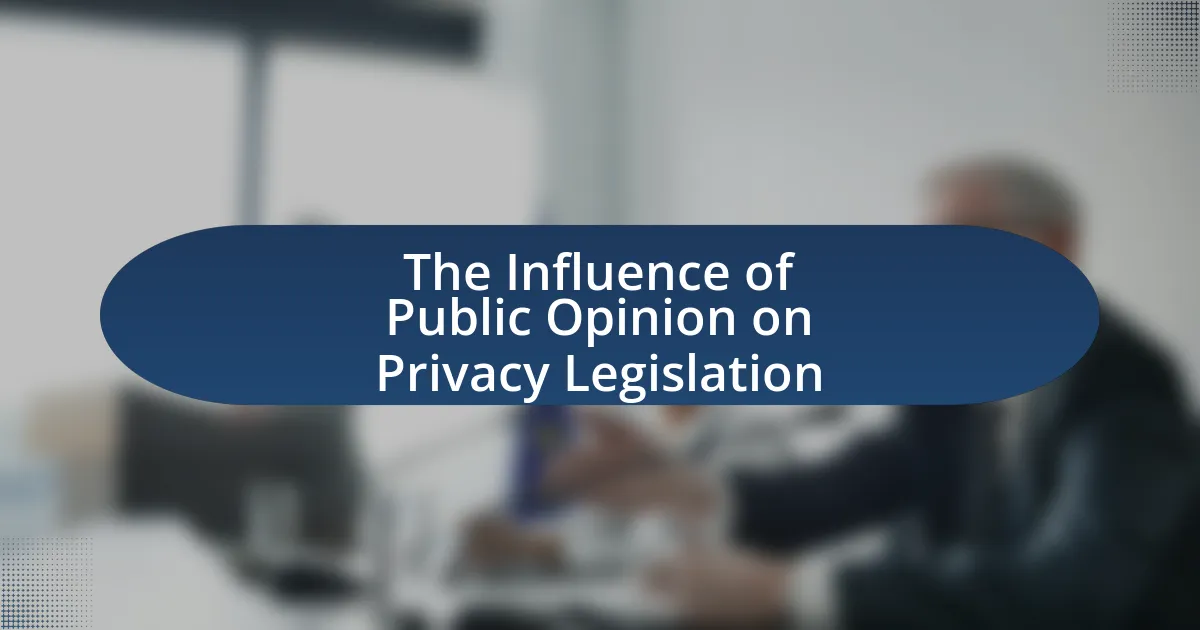The California Consumer Privacy Act (CCPA) is a significant data privacy law that grants California residents specific rights regarding their personal information, including the rights to know, access, delete, and opt-out of the sale of their data. This article provides a comprehensive overview of the CCPA, detailing how it defines personal information, the types of data covered, and the obligations imposed on businesses. It also explores consumer rights under the CCPA, the enforcement mechanisms in place, and the implications for consumer privacy. Additionally, the article addresses common misconceptions, challenges consumers face, and practical steps they can take to protect their privacy in light of this legislation.

What is the CCPA and why is it important for consumers?
The California Consumer Privacy Act (CCPA) is a data privacy law that grants California residents specific rights regarding their personal information. It is important for consumers because it empowers them to know what personal data is being collected, allows them to access that data, and provides the option to request deletion of their information. The CCPA also mandates that businesses disclose their data collection practices and gives consumers the right to opt-out of the sale of their personal information. This law enhances consumer control over personal data, reflecting a growing demand for privacy rights in the digital age.
How does the CCPA define personal information?
The California Consumer Privacy Act (CCPA) defines personal information as any information that identifies, relates to, describes, or can be associated with a particular consumer or household. This includes a wide range of data such as names, addresses, email addresses, social security numbers, and even online identifiers. The CCPA emphasizes that personal information encompasses not only direct identifiers but also indirect identifiers that can be used to infer the identity of an individual or household, thereby broadening the scope of what constitutes personal information under the law.
What types of personal information are covered under the CCPA?
The California Consumer Privacy Act (CCPA) covers various types of personal information, including identifiers such as names, addresses, and email addresses; commercial information like purchase history; biometric data; internet activity including browsing history; geolocation data; and inferences drawn from personal information to create consumer profiles. These categories are defined to ensure consumers have rights regarding their personal data, reflecting the CCPA’s aim to enhance privacy protections for California residents.
How does the CCPA differ from other privacy laws?
The California Consumer Privacy Act (CCPA) differs from other privacy laws primarily in its broad consumer rights and business obligations. Unlike many privacy regulations, the CCPA grants California residents specific rights to access, delete, and opt-out of the sale of their personal information, which is not universally available in other laws such as the General Data Protection Regulation (GDPR) that applies to the European Union. Additionally, the CCPA applies to a wider range of businesses, including those that meet certain revenue thresholds or handle large volumes of personal data, whereas other laws may have more restrictive applicability criteria. This distinction highlights the CCPA’s unique approach to consumer empowerment and business accountability in the realm of data privacy.
What rights do consumers have under the CCPA?
Consumers have several rights under the California Consumer Privacy Act (CCPA), including the right to know, the right to delete, the right to opt-out, and the right to non-discrimination. The right to know allows consumers to request information about the personal data collected about them, including the categories of data and the purposes for which it is used. The right to delete enables consumers to request the deletion of their personal information held by businesses. The right to opt-out gives consumers the ability to direct businesses not to sell their personal information. Lastly, the right to non-discrimination ensures that consumers who exercise their CCPA rights are not treated unfairly or denied services. These rights are established to enhance consumer control over personal data and are enforceable under California law.
How can consumers access their personal information?
Consumers can access their personal information by submitting a request to businesses that collect their data, as mandated by the California Consumer Privacy Act (CCPA). Under the CCPA, consumers have the right to know what personal information is being collected about them, the purpose of its collection, and whether it is being sold or disclosed to third parties. Businesses are required to provide a clear and accessible method for consumers to submit these requests, typically through a designated web page or customer service contact. The law stipulates that businesses must respond to these requests within 45 days, ensuring consumers can obtain their information in a timely manner.
What are the implications of the right to delete personal information?
The right to delete personal information allows consumers to request the removal of their data from businesses, significantly impacting data privacy and consumer control. This right enhances individual autonomy over personal data, ensuring that consumers can manage their digital footprints and mitigate risks associated with data breaches or misuse. Under the California Consumer Privacy Act (CCPA), businesses must comply with deletion requests unless specific exceptions apply, such as the need to retain data for legal obligations. This legal framework reinforces the importance of transparency and accountability in data handling practices, compelling businesses to adopt more robust data management policies.
What obligations do businesses have under the CCPA?
Businesses have several obligations under the California Consumer Privacy Act (CCPA). They must provide consumers with clear information about the categories of personal data collected, the purposes for which the data is used, and the rights consumers have regarding their data. Additionally, businesses are required to implement reasonable security measures to protect personal information and must respond to consumer requests for data access, deletion, and opt-out of data selling within specified timeframes. The CCPA also mandates that businesses maintain records of consumer requests and their responses to demonstrate compliance.
How must businesses disclose their data collection practices?
Businesses must disclose their data collection practices clearly and transparently, as mandated by the California Consumer Privacy Act (CCPA). This includes providing consumers with information about the categories of personal data collected, the purposes for which the data is used, and the third parties with whom the data is shared. The CCPA requires that this information be made available in a privacy policy that is easily accessible to consumers, ensuring that individuals can understand how their data is being handled. Compliance with these disclosure requirements is essential for businesses to avoid penalties and to foster trust with consumers.
What are the penalties for non-compliance with the CCPA?
The penalties for non-compliance with the California Consumer Privacy Act (CCPA) can include fines of up to $2,500 for each unintentional violation and up to $7,500 for each intentional violation. The California Attorney General is responsible for enforcing these penalties, and businesses have a 30-day period to cure any alleged violations after being notified before penalties are imposed. This enforcement mechanism underscores the importance of compliance for businesses operating in California.

How does the CCPA impact consumer privacy?
The California Consumer Privacy Act (CCPA) significantly enhances consumer privacy by granting California residents specific rights regarding their personal information. Under the CCPA, consumers have the right to know what personal data is being collected about them, the purpose of its collection, and the ability to access, delete, or opt-out of the sale of their personal information. This legislation mandates businesses to be transparent about their data practices and imposes penalties for non-compliance, thereby fostering a more privacy-conscious environment. The CCPA’s impact is evident as it sets a precedent for consumer privacy laws in the United States, influencing other states to consider similar regulations.
What are the benefits of the CCPA for consumers?
The California Consumer Privacy Act (CCPA) provides significant benefits for consumers by enhancing their privacy rights and control over personal information. Consumers can access their data held by businesses, request deletion of their personal information, and opt out of the sale of their data. These rights empower consumers to make informed decisions about their privacy and data usage. The CCPA also mandates transparency from businesses regarding their data collection practices, requiring them to disclose what personal information is collected and how it is used. This increased transparency helps consumers understand their rights and the implications of sharing their data.
How does the CCPA enhance consumer control over personal data?
The California Consumer Privacy Act (CCPA) enhances consumer control over personal data by granting individuals specific rights regarding their personal information. These rights include the ability to know what personal data is being collected, the right to access that data, the right to request deletion of their data, and the right to opt-out of the sale of their personal information. The CCPA mandates that businesses disclose their data collection practices and provide consumers with clear options to manage their data, thereby empowering consumers to make informed decisions about their personal information.
What role does transparency play in consumer trust?
Transparency is crucial in building consumer trust as it fosters openness and accountability between businesses and their customers. When companies clearly communicate their practices, policies, and data usage, consumers feel more secure and confident in their interactions. Research indicates that 86% of consumers are willing to pay more for a better customer experience, which is heavily influenced by transparency. Furthermore, a study by the Edelman Trust Barometer shows that 81% of consumers need to trust a brand to buy from them, highlighting the direct correlation between transparency and trust.
What challenges do consumers face with the CCPA?
Consumers face several challenges with the California Consumer Privacy Act (CCPA), primarily related to understanding their rights and navigating the compliance landscape. Many consumers lack awareness of the specific rights granted by the CCPA, such as the right to know what personal data is collected and the right to request deletion of that data. This lack of awareness can lead to underutilization of these rights. Additionally, consumers often encounter difficulties in exercising their rights due to complex privacy policies and varying compliance practices among businesses. A survey by the California Attorney General’s Office indicated that a significant percentage of consumers feel confused about how to exercise their rights under the CCPA, highlighting the need for clearer communication from businesses regarding their data practices.
How can consumers effectively exercise their rights under the CCPA?
Consumers can effectively exercise their rights under the California Consumer Privacy Act (CCPA) by submitting verified requests to businesses regarding their personal information. This includes the right to know what personal data is collected, the right to delete that data, and the right to opt-out of the sale of their information. To do this, consumers should identify the business’s designated methods for submitting requests, which are often outlined in their privacy policies. Additionally, consumers must provide sufficient information to verify their identity, as businesses are required to confirm the identity of the requester before fulfilling requests. According to the California Attorney General’s guidelines, businesses must respond to requests within 45 days, ensuring consumers are informed of their rights and the actions taken.
What are common misconceptions about the CCPA?
Common misconceptions about the California Consumer Privacy Act (CCPA) include the belief that it applies to all businesses, that it guarantees complete privacy, and that consumers cannot opt out of data sales. The CCPA specifically applies to businesses that meet certain criteria, such as having annual gross revenues over $25 million or collecting personal data from 50,000 or more consumers. Additionally, while the CCPA enhances consumer privacy rights, it does not provide absolute privacy, as businesses can still collect and use data under specific conditions. Lastly, consumers do have the right to opt out of the sale of their personal information, but this right must be actively exercised by the consumer, which can lead to confusion about its automatic application.

What should consumers know about the enforcement of the CCPA?
Consumers should know that the enforcement of the California Consumer Privacy Act (CCPA) is primarily the responsibility of the California Attorney General. The CCPA grants consumers the right to take legal action against businesses that violate their privacy rights, including the right to sue for statutory damages ranging from $100 to $750 per incident. Additionally, the law allows for enforcement actions by the Attorney General, who can impose fines of up to $7,500 per violation. This framework ensures that consumers have both individual and collective means to hold businesses accountable for non-compliance with the CCPA.
How is the CCPA enforced and who oversees it?
The California Consumer Privacy Act (CCPA) is enforced primarily by the California Attorney General’s Office. This office has the authority to investigate violations, issue fines, and take legal action against businesses that fail to comply with the CCPA. The enforcement mechanism includes a 30-day notice period for businesses to rectify violations before penalties are imposed, which can reach up to $7,500 per violation. Additionally, consumers have the right to sue businesses for certain violations, particularly in cases of data breaches. This dual enforcement structure ensures both state oversight and consumer empowerment in protecting personal data.
What actions can consumers take if their rights are violated?
Consumers can take several actions if their rights are violated under the California Consumer Privacy Act (CCPA). They can file a complaint with the California Attorney General’s office, which investigates violations and can impose penalties on businesses that fail to comply with the CCPA. Additionally, consumers have the right to sue businesses for statutory damages if their personal information is subject to unauthorized access, theft, or disclosure due to a violation of the CCPA. This legal recourse allows consumers to seek compensation for damages incurred. The CCPA empowers consumers to protect their privacy rights effectively, ensuring accountability from businesses.
How can consumers report non-compliance by businesses?
Consumers can report non-compliance by businesses to the California Attorney General’s office. This can be done by submitting a complaint through the Attorney General’s website, where consumers can provide details about the alleged violations of the California Consumer Privacy Act (CCPA). The Attorney General has the authority to investigate these complaints and take appropriate action against businesses that fail to comply with the CCPA, which aims to protect consumer privacy rights.
What are the future implications of the CCPA for consumers?
The future implications of the California Consumer Privacy Act (CCPA) for consumers include enhanced privacy rights and greater control over personal data. As the CCPA evolves, consumers will likely benefit from increased transparency regarding how businesses collect, use, and share their personal information. This law empowers consumers to request access to their data, demand deletion, and opt-out of the sale of their information, which can lead to more informed choices and improved data security practices among companies. Additionally, as more states adopt similar legislation, consumers nationwide may experience a shift towards stronger privacy protections, fostering a culture of accountability in data handling.
How might the CCPA evolve in response to technological changes?
The California Consumer Privacy Act (CCPA) may evolve by incorporating more stringent regulations on data collection and usage as technology advances. As new technologies such as artificial intelligence and machine learning become prevalent, the CCPA could adapt to address the complexities of data processing and consumer privacy concerns associated with these innovations. For instance, the rise of biometric data collection and the Internet of Things (IoT) may prompt the CCPA to expand its definitions of personal information and enhance consumer rights regarding data access and deletion. Additionally, ongoing developments in data security technologies could lead to updated compliance requirements for businesses to ensure consumer data protection. These potential changes reflect the need for the CCPA to remain relevant and effective in safeguarding consumer privacy in an increasingly digital landscape.
What trends are emerging in consumer privacy legislation?
Emerging trends in consumer privacy legislation include the increasing adoption of comprehensive data protection laws, enhanced consumer rights, and greater regulatory scrutiny on data practices. For instance, states like California and Virginia have enacted laws that grant consumers rights to access, delete, and opt-out of the sale of their personal information. Additionally, there is a growing emphasis on transparency, requiring businesses to disclose their data collection and sharing practices clearly. The trend towards federal legislation is also gaining momentum, as discussions around a national privacy framework continue to evolve, reflecting the need for consistent standards across states. These trends are supported by the rising public demand for privacy protections, evidenced by surveys indicating that a significant majority of consumers are concerned about their data privacy and support stronger regulations.
What practical steps can consumers take to protect their privacy?
Consumers can protect their privacy by implementing several practical steps. First, they should regularly review and adjust privacy settings on social media platforms and online accounts to limit data sharing. Additionally, using strong, unique passwords for different accounts and enabling two-factor authentication can significantly enhance security. Consumers should also be cautious about the information they share online, avoiding unnecessary personal details and being selective about the apps and services they use. Furthermore, utilizing privacy-focused browsers and search engines can help minimize tracking. According to a 2021 survey by the Pew Research Center, 81% of Americans feel they have little to no control over the data collected about them, highlighting the importance of proactive measures in privacy protection.
How can consumers stay informed about their rights under the CCPA?
Consumers can stay informed about their rights under the California Consumer Privacy Act (CCPA) by regularly visiting the official California Attorney General’s website, which provides comprehensive resources and updates regarding consumer rights. The website includes detailed information on the rights granted by the CCPA, such as the right to know, the right to delete, and the right to opt-out of the sale of personal information. Additionally, consumers can subscribe to newsletters or alerts from privacy advocacy organizations that focus on data protection and privacy laws, ensuring they receive timely updates and educational materials related to their rights under the CCPA.
What best practices should consumers follow to safeguard their personal information?
Consumers should follow several best practices to safeguard their personal information, including using strong, unique passwords for different accounts, enabling two-factor authentication, and being cautious about sharing personal details online. Strong passwords reduce the risk of unauthorized access, while two-factor authentication adds an extra layer of security. According to a 2021 study by the Cybersecurity & Infrastructure Security Agency, 81% of data breaches are linked to weak or stolen passwords, highlighting the importance of these practices. Additionally, consumers should regularly monitor their financial statements and credit reports for any suspicious activity, as early detection can mitigate potential damage.





